u2词汇
八年级仁爱英语上册u2t2知识点
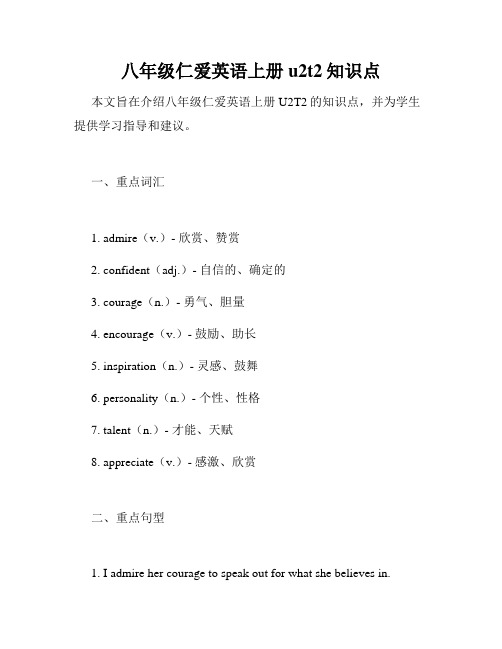
八年级仁爱英语上册u2t2知识点本文旨在介绍八年级仁爱英语上册U2T2的知识点,并为学生提供学习指导和建议。
一、重点词汇1. admire(v.)- 欣赏、赞赏2. confident(adj.)- 自信的、确定的3. courage(n.)- 勇气、胆量4. encourage(v.)- 鼓励、助长5. inspiration(n.)- 灵感、鼓舞6. personality(n.)- 个性、性格7. talent(n.)- 才能、天赋8. appreciate(v.)- 感激、欣赏二、重点句型1. I admire her courage to speak out for what she believes in.(我钦佩她为捍卫信仰而勇敢发声。
)2. She is confident that she can pass the test.(她有信心可以通过考试。
)3. Don't be afraid to make mistakes. You can learn from them.(不要害怕犯错。
你可以从中学习。
)4. He encouraged me to pursue my dreams.(他鼓励我追逐我的梦想。
)5. The sight of the beautiful sunset was an inspiration to the painter.(美丽的日落景象激发了画家的灵感。
)三、语法知识1. 介词的用法介词是一种连接词,用来表达名词、代词或动词与其他词语之间的关系。
介词常常被用来表示时间、地点和方向等,如:in the morning(在早上)、at school(在学校)、toward the park(朝公园的方向)等。
2. 形容词的比较级和最高级形容词的比较级用于比较两个事物的大小、程度或属性等,通常在形容词后加-er,如:bigger(更大的)、smarter(更聪明的)等。
U2词汇周周练
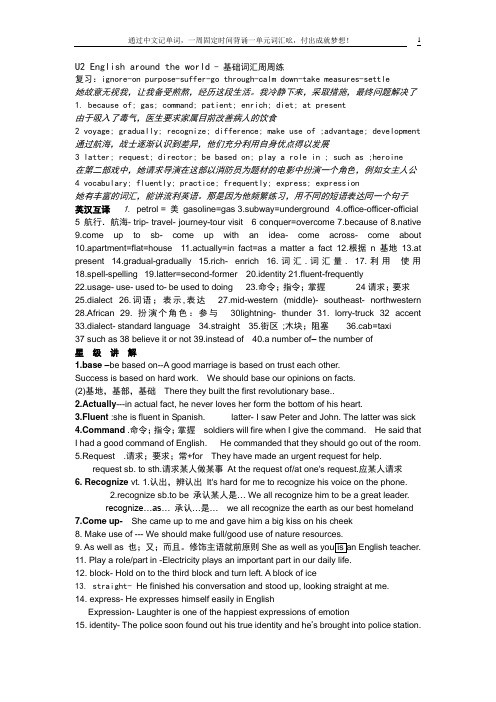
U2 English around the world - 基础词汇周周练复习:ignore-on purpose-suffer-go through-calm down-take measures-settle她故意无视我,让我备受煎熬,经历这段生活。
我冷静下来,采取措施,最终问题解决了1. because of; gas; command; patient; enrich; diet; at present由于吸入了毒气,医生要求家属目前改善病人的饮食2 voyage; gradually; recognize; difference; make use of ;advantage; development 通过航海,战士逐渐认识到差异,他们充分利用自身优点得以发展3 latter; request; director; be based on; play a role in ; such as ;heroine在第二部戏中,她请求导演在这部以消防员为题材的电影中扮演一个角色,例如女主人公4 vocabulary; fluently; practice; frequently; express; expression她有丰富的词汇,能讲流利英语。
那是因为他频繁练习,用不同的短语表达同一个句子英汉互译 1. petrol = 美gasoline=gas 3.subway=underground 4.office-officer-official 5 航行.航海- trip- travel- journey-tour visit 6 conquer=overcome 7.because of 8.nativee up to sb- come up with an idea- come across- come about10.apartment=flat=house 11.actually=in fact=as a matter a fact 12.根据n 基地13.at present 14.gradual-gradually 15.rich- enrich 16.词汇.词汇量. 17.利用使用18.spell-spelling tter=second-former 20.identity 21.fluent-frequentlyage- use- used to- be used to doing 23.命令;指令;掌握24请求;要求 25.dialect 26.词语;表示,表达27.mid-western (middle)- southeast- northwestern 28.African 29. 扮演个角色:参与30lightning- thunder 31. lorry-truck 32 accent 33.dialect- standard language 34.straight 35.街区;木块;阻塞36.cab=taxi37 such as 38 believe it or not 39.instead of 40.a number of– the number of星级讲解1.base–be based on--A good marriage is based on trust each other.Success is based on hard work. We should base our opinions on facts.(2)基地,基部,基础There they built the first revolutionary base..2.Actually---in actual fact, he never loves her form the bottom of his heart.3.Fluent :she is fluent in Spanish. latter- I saw Peter and John. The latter was sickmand .命令;指令;掌握soldiers will fire when I give the command. He said thatI had a good command of English. He commanded that they should go out of the room.5.Request .请求;要求;常+for They have made an urgent request for help.request sb. to sth.请求某人做某事At the request of/at one's request.应某人请求6. Recognize vt. 1.认出,辨认出It's hard for me to recognize his voice on the phone.2.recognize sb.to be 承认某人是… We all recognize him to be a great leader.recognize…as… 承认…是… we all recognize the earth as our best homelande up- She came up to me and gave him a big kiss on his cheek8. Make use of --- We should make full/good use of nature resources.9. As well as 也;又;而且。
英语2级词汇
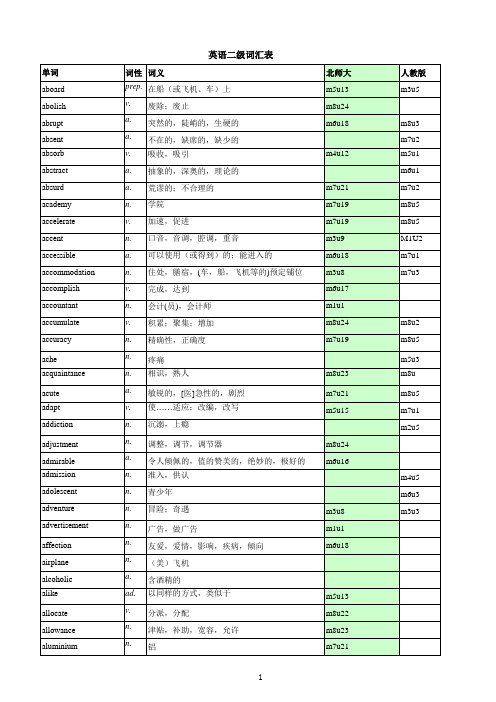
bacterium (pl.bacteria) n. 细菌
2
北师大 m3u8 m4u11 m7u21 m4u11 m3u7,m7u20 m8u24 m4u11 m3u7 m4u12 m4u12
m7u19 m5u15 m4u10 m8u24 m2u6 m6u16 m5u15 m2u4
m4u10
m4u11 m5u13 m5u15 m3u7 m6u16 m7u20
n. 广告,做广告 n. 友爱,爱情,影响,疾病,倾向 n. (美)飞机 a. 含酒精的 ad. 以同样的方式,类似于 v. 分派,分配 n. 津贴,补助,宽容,允许 n. 铝
北师大 m5u13 m8u24 m6u18
m4u12
m7u21 m7u19 m7u19 m3u9 m6u18 m3u8 m6u17 m1u1 m8u24 m7u19
m8u1 m8u2 M1U4 m6u2 m4u5
m3u5
M1U2
m6u1
m2u3 m6u4 m1u4
m2u4,m7u2 m5u3 m3u2 m6u1 m4u4 m8u2 m6u4 m6u4
m8u1 m8u3
m7u19
m7u1
单词 challenging chant cheat cheek
cheerful cheese chef chemist chemistry cheque = check
单词 aboard abolish abrupt absent absorb abstract absurd academy accelerate accent accessible accommodation accomplish accountant accumulate accuracy
英语u2单词泽林版五年级上册

英语u2单词泽林版五年级上册《泽林版五年级上册英语Unit 2的单词详细资料》。
1. weekend.- 音标:英 [ˌwiːkˈend] 美 [ˈwiːkend]。
- 词性:名词。
- 出处:本单元教材课文及日常英语交流常用词汇。
- 解释:周末。
- 造句:I often play football on weekends.(我经常在周末踢足球。
)。
- 近义词:weekends(复数形式常用于泛指周末)、holiday(假日,假期,范围更广)。
- 反义词:weekday(工作日)。
2. wash.- 音标:英 [wɒʃ] 美 [wɑːʃ]。
- 词性:动词。
- 出处:教材中关于日常活动描述的相关内容。
- 解释:洗。
- 造句:I wash my clothes every Sunday.(我每个周日洗衣服。
)。
- 近义词:clean(清洁,打扫,含义更广泛)。
- 反义词:dirty(使变脏)。
3. watch.- 音标:英 [wɒtʃ] 美 [wɑːtʃ]。
- 词性:动词。
- 出处:涉及日常活动安排的课文部分。
- 解释:看(电视、比赛等)。
- 造句:I often watch TV in the evening.(我经常在晚上看电视。
)。
- 近义词:look at(看,强调看的动作)、see(看见,强调结果)。
- 反义词:ignore(忽视,不理会)。
4. read.- 音标:英 [riːd] 美 [riːd]。
- 词性:动词。
- 出处:与学习、日常活动相关的教材内容。
- 解释:读;阅读。
- 造句:I read books every day.(我每天都读书。
)。
- 近义词:peruse(仔细阅读)。
- 反义词:write(写)。
5. play.- 音标:英 [pleɪ] 美 [pleɪ]。
- 词性:动词。
- 出处:描述课余活动的课文部分。
- 解释:参加(比赛);玩耍。
- 造句:We play football after school.(我们放学后踢足球。
英语人教版选修7U2词汇表

Unit 2 Array△household adj.家庭的;家用的n.一家人;家庭fiction n.小说; 虚构或想象出来的事. Desire n.渴望;欲望;渴求vt.希望得到; 想要△Isaac Asimov 艾萨克?阿西莫夫satisfaction n .满意;满足;令人满意的事物△Larry Belmont 拉里贝尔蒙特test out 试验;考验△Claire n.克莱尔(女名)bonus n.额外津贴;奖金,红利alarm vt.使警觉;使惊恐;惊动n.警报;alarmed adj.担心的; 害怕的apron n. 围裙sympathy n.同情(心)overweight adj.超重的; 体重超常的elegant adj.优雅的; 高雅的;讲究的△Gladys Claffern 格拉迪斯?克拉芬favour n.喜爱; 恩惠vt.喜爱;偏祖pile n.堆; 摞vi.堆起;堆积v.把....堆起;积聚scan vt.细看;仔细检查;粗略地看;浏览; 扫描fingernail n.手指甲absurd adj.荒谬的; 可笑的haircut n.发型;理发△makeup n.化妆品.accompany vt.陪伴;伴奏cushion n. (坐、跪时用的)软垫;靠垫;垫子bedding n.寝具; 铺盖necklace n.项链clerk n. 售货员; 职员;旅馆接待员counter n. 柜台; 计数器ring up ....打电话turn around 转向;回转awful adj.极坏的;极讨厌的;affair n.事务;事情;暖昧关系armchair n.扶手椅; 单座沙发declare vt.宣布; 声明;表明;宣称cuisine n. 烹饪(风味);菜肴envy vt.忌妒;羡慕leave..alone不管: 别惹; ....一个人待着; .....digital adj.数字的;数码的;手指的;脚趾mailbox n.(美)邮筒;信箱state vt.陈述;宣布aside adv. 在一边;向一边set aside ......一-边;为.....省或保留( 钱或时间)。
高中英语真题-U2重点词汇讲解_6
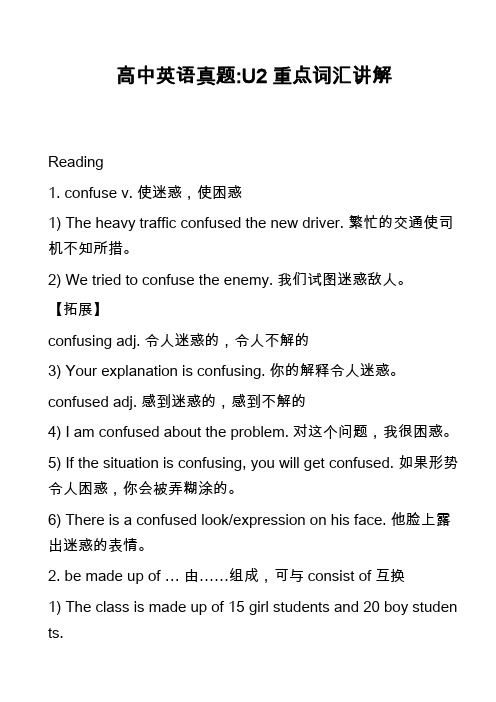
高中英语真题:U2重点词汇讲解Reading1. confuse v. 使迷惑,使困惑1) The heavy traffic confused the new driver. 繁忙的交通使司机不知所措。
2) We tried to confuse the enemy. 我们试图迷惑敌人。
【拓展】confusing adj. 令人迷惑的,令人不解的3) Your explanation is confusing. 你的解释令人迷惑。
confused adj. 感到迷惑的,感到不解的4) I am confused about the problem. 对这个问题,我很困惑。
5) If the situation is confusing, you will get confused. 如果形势令人困惑,你会被弄糊涂的。
6) There is a confused look/expression on his face. 他脸上露出迷惑的表情。
2. be made up of …由……组成,可与consist of 互换1) The class is made up of 15 girl students and 20 boy studen ts.= The class consists of 15 girl students and 20 boy students.班级由15个女生和20个男生组成。
注意两者作定语时的区别a group made up of five doctors and 10 nurses= a group consisting of five doctors and 10 nurses【拓展】:be made of/be made from/be made out of 由……制成be made into 被制成make up 组成,编制,弥补,化妆,和解make for 走向……;有助于……make out 理解,辨认出2) The old building is made of stone. 这幢老房子是由石头建成的。
Book6U2重点词汇讲解

U2 重点词汇讲解1. injure比较wound, injure 和hurtwound和injure均可指对身体的伤害。
但wound侧重利器或子弹对肉体的伤害,是故意的行为,常与战争有关;而injure强调人在意外事故中受伤,如机器造成的或运动中受伤。
hurt既可以是重伤,也可以是轻伤。
同时也可以是伤害感情。
1. She was _____because she was not invited to the party. (hurt)2. He couldn’t come to work because he was knocked down by a bike and _____his feet.(injured)3. In that battle two of our soldiers were killed and five were ________. (wounded)2. apart adj, adv.1). 相距The two buildings are 100 meters apart.2). 成碎片The cup fell apart in my hand.3). 分开,分离You never see them apart these days.apart from 远离; 除……外;Apart from a house in Nanjing, they also have one in Beijing. (=besides)Apart from a few words, I don’t know any French at all. (=Except for)3. junior (年少的,初级的)junior middle school 初中He is junior to me. 他的职位比我低。
He is three years my junior. 他比我小3岁4. in difficult timestimes 时代;时势in ancient times _______________________in the times of Henry III _____________________________the actors of the times _______________________________Times ______ (have) changed.5. dedicate1)dedicate sth. to (doing) sth.Andy wants to dedicate more time to his hobbies.This woman has dedicated her whole life to helping others.2) dedicate oneself to sth.把自己献身于……He dedicated himself to academic work.3) dedicate sth. to sb. 题词把……献给某人Lynne has dedicated the novel to her friend Norma.6. cost1) 花费某人……(钱/时间/精力/劳动)The book cost me 5 yuan.2) 使某人付出……代价His carelessness cost him his life.常用搭配:1)cost sth. to do sth.How much does it cost to hire a bike?2)cost sb. dearly: cause a serious lossWe made two mistakes that cost us dearly.3)at the cost of …以……为代价He saved the boy from the fire at the cost of his life.7. be rushed to somewhere.rush sb. to/ into/ off … : to take or send someone or something somewhere in a hurry.急忙送……到……Eg: Frank was rushed to hospital with violent stomach pains.rush sb. into (doing) sth.: 催促(某人);使……赶紧eg: You can’t rush someone into marrying you.rush into sth.: 仓促做;急忙做eg: Try not to rush into a decision you may later regret.最好别仓促作出决定,否则你以后会后悔的。
U2的知识点七年级上册
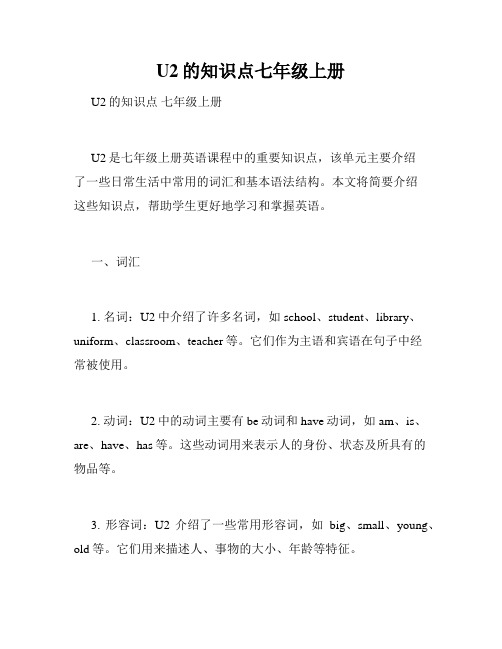
U2的知识点七年级上册U2的知识点七年级上册U2是七年级上册英语课程中的重要知识点,该单元主要介绍了一些日常生活中常用的词汇和基本语法结构。
本文将简要介绍这些知识点,帮助学生更好地学习和掌握英语。
一、词汇1. 名词:U2中介绍了许多名词,如school、student、library、uniform、classroom、teacher等。
它们作为主语和宾语在句子中经常被使用。
2. 动词:U2中的动词主要有be动词和have动词,如am、is、are、have、has等。
这些动词用来表示人的身份、状态及所具有的物品等。
3. 形容词:U2介绍了一些常用形容词,如big、small、young、old等。
它们用来描述人、事物的大小、年龄等特征。
4. 副词:U2中的副词主要用来修饰动词,例如well、quickly、slowly等,它们可以帮助我们更准确的表达意思。
5. 介词:U2中介绍的介词有in、on、at等。
它们主要用来表示时间、地点等方面的信息,如in the morning、on the table、at school等。
二、基本句型U2中介绍的基本句型是主语+be动词或主语+have动词。
学生需要掌握这些基本句型,熟练掌握其中的用法,才能更好地理解和运用英语。
1. 主语+be动词:该句型主要用来描述人的身份、状态等信息。
例如:I am a student. She is young.2. 主语+have动词:该句型主要用来表示人所具有的物品等信息。
例如:He has a new bike. They have two cats.三、常用表达1. 问候语:U2中介绍了一些日常用语,如Good morning、Good afternoon、How are you?等。
如果学生能熟练运用这些问候语,将有助于提高其日常交流能力。
2. 介绍自己:在U2中,学生需要学习如何介绍自己,例如:I am Tom. I am 14 years old. I am from China. 这些表达方式可以使学生更好地介绍自己。
- 1、下载文档前请自行甄别文档内容的完整性,平台不提供额外的编辑、内容补充、找答案等附加服务。
- 2、"仅部分预览"的文档,不可在线预览部分如存在完整性等问题,可反馈申请退款(可完整预览的文档不适用该条件!)。
- 3、如文档侵犯您的权益,请联系客服反馈,我们会尽快为您处理(人工客服工作时间:9:00-18:30)。
▪Unit2 English Around the world▪conquer▪vt. 1.(武力)征服;攻克▪ 2.克服,战胜, 改正(恶习等);抑制▪vi. 得胜▪conquer shyness 战胜羞怯▪conquer bad habits 克服不良习惯▪the conquered 被征服者,败者▪人定胜天。
▪Man can conquer nature.▪非胜即死,不成功便成仁。
▪To conquer or to die.▪actually▪adv. 实际上, 事实上, 竟然, 居然, 如今▪in fact实际上▪as a matter of fact事实上,跟你说实话吧▪really 真正地▪truly 真地▪Some of the people actually took up their arms.▪Actually it is we that owe you a lot.▪实际上,应该是我们感谢你.▪voyage▪n. 航程, 航空, 航海记, 旅行记▪vi. 航海, 航行▪voyage: a journey by sea to a foreign or distant land▪journey: the act of travelling from one place to another▪travel: a series of journeys▪trip: a short going from one place to another▪tour: a trip with visits to various places of interest for business, pleasure, or instruction▪They went on a long train journey across India.▪Workers had to make several trips to bring▪all the equipment over.▪ 3. We were given a guided tour of the palace.▪ 4. Please tell us more about your travels.▪journey 侧重指时间较长,距离较远的旅行;▪trip 通常指短距离的旅行,有“往返某地”的意思,▪口语里较常用。
▪tour一般指以观光,考察为目的的旅行,距离可长▪可短,旅途中有停留游览点。
▪travel泛指旅行的行为而不指某次具体的旅行;▪还可指出国旅游。
▪go on a trip 去旅行▪ a round trip(乘船/飞机/火车)来回票;▪[美]往返旅行, 周游▪make a tour of…周游…▪collective tour 团体旅行▪package tour▪由旅行社代办全部事宜的观光旅游▪travel around the world 周游世界▪the travels of Marco Polo▪马可·波罗游记▪ A pleasant journey to you!▪祝你一路顺风!▪▪at present: now; at this time, at this moment▪She’s busy at present and can’t speak to you.▪她现在很忙,不能跟你谈活。
▪2) At present he is a professor of mathematics at Cambridge.▪目前他是剑桥大学的数学教授。
▪People ____ the meeting were scientists.▪ A. were present at B.present to▪ C.who are present at D.present at▪present leaders 现任领导▪Adj.be present at▪be absent from▪Vt. present sth. to sb./present sb.sth.▪他们献花给老师.▪They presented their teacher some flowers.▪more than▪He is more than 50 years old this year.▪Harry learns more than magic at Hogwarts.▪She is more than our landlord. She is our friend as well.▪It is more green than blue.▪Bamboo can be used more than eating.▪no more than = only 只有▪not more than = at most 最多▪because & because of▪因为你的关心,我发现生活充满了希望。
▪1)Because you are concerned about me, I find that life is full of hope.▪2)Because of your concern, I find that life is full of hope.▪因为雨下得很大,那个男孩穿过树林回家了。
▪1)Because it rained heavily, the boy went back home through the woods.▪2)Because of the heavy rain, the boy went back home through the woods.▪▪ 3.---Why is she so sad?▪---_____ what you said.▪ A.Because B.Since C.As D.Because of▪because of/ owing to/ due to/ thanks to▪Thanks to the government’s help, we can build a new school now.▪Thanks to the rain, we didn’t finish our work yesterday.▪make use of▪We must make use of our limited time and money.▪Natural resources should be made scientific use of.▪ 1.Time should _______ to realize our dream.▪be made full use of▪ 2.We should consider ____ use can ____ such books.▪ A . how; be made of▪ B. what; be made of▪We must know the use the people ____ waste things.▪ A. make B. make of C. make good of▪ D.make from▪It is no use doing…▪It’s no use arguing with her—she is unreasonable.▪Put…to good use▪We should put our limited money to good use.▪Be of no use▪This sweater is of no use to me; it’s too short.▪such as▪We eat some fruit every day, such as apples, bananas and oranges.▪That is/namely▪He can speak three languages, that is ,Chinese, English and French.▪For example, like, such as▪Noise , for example, is a kind of pollution.▪Some animals, like/such as the cat, the dog or the bird, can get on well with humans. ▪These goods will be transported to such provinces as Shandong, Jiangsu and Zhejiang.▪He is such a lovely boy that everyone likes him.▪Beijing was attacked by such a terrible sandstorm as few cities had ever experienced before.▪even if /even though▪even if 从句所说的不肯定;而even though从句所说的则是事实▪He will not let out the secret even if he knows it.▪He will not let out the secret even though he knows it.▪Base…on/upon▪Be based on/upon▪The film is based on a novel written by Ernest Hemingway.▪India has a good scientific research base.▪The northeast is seen as the traditional base of China’s heavy industry. ▪Before you go skiing, you should learn some basic knowledge of it.▪basis基础, 基本, 根据▪base room /basement地下室▪ e up to the front of the classroom so that everyone can see you.▪ 2.Your name came up in our conversation once or twice.▪ 3.The sun had come up by the time I finished my work.▪ 4.The question never came up.▪ 5.a general who came up from the ranks▪Come up with 提出,宣布(active voice)▪Come up with a solution to the problem▪Come up with a cure for the disease▪Come true vi.—realize one’s dream实现,达到▪Come along vi.进展▪Things are coming along fine.▪Come around/round vi.恢复,还原,改变意见▪Come down vi.传承,按习惯处理▪Come in 到达▪Come on 催促(好了,别装了…) 逐渐开始,递增▪come out 出来,出版,真相大白vi.▪The author’s new book just came out. (be published)▪Everything came out wrong.(结束)▪come across vt. 偶然碰到▪come back 恢复,在回忆中重现▪come into use 开始使用▪come to 合计,苏醒过来▪come away 离开▪come over 来访,传来, 偶然拜访▪come about vi.发生,转向▪The identity of the killers is still unknown.▪identity card---ID card▪同一性, 身份, 一致, 特性▪identify vt.认出,鉴定▪The woman was asked to identify the criminal.▪She has stayed in Japan for ten years, and she is fluent in Japanese.▪The foreigner spoke Chinese fluently and I was amazed at the fluency. ▪▪扮演角色,起作用,参与▪Besides diet, exercise also plays an important part/role in losing weight. ▪He had no part in the crime and shouldn’t be put into prison.▪play the part of…扮演…角色▪for the most part 多半,通常▪Teachers ,for the most part, are responsible and serious.▪Who will play the part of Chairman Mao in the next film?▪The army is under his command.▪Who gave the command?▪She has a good command of English.▪n. (order, control, ability to use)命令,指令▪The teacher commanded that the exercise (should) be finished in an hour. ▪command sb. to do…▪v.命令,控制,掌握▪Command/request/suggest/advice + that (should)▪n. --act of asking for sth. in speech or writing▪make a request for sth.▪Your request will be granted.▪In the countryside, buses can stop by request.▪request sth. from/of sb.▪request sb. to do…: to ask sb. esp. politely in speech or writing to do sth. ▪I request him to help me with it.▪request that…(should)▪▪I ask her to shut the window.▪Passengers are kindly requested not to smoke in the car.▪He knew he had hurt her and begged her to forgive him.▪--to know again sb./sth. that you have seen or heard before▪ 1.recognize an old acquaintance▪认出一位老相识(认识; 认出; 辨认)▪~ sb./sth. by/from sth.▪ 2.recognize this new government▪承认这个新政府(承认, 认可)▪~ sb./sth. to be…/as…▪Beckham is ~d as one of the best football players in the world.▪I ~ that some of my ideas are unrealistic.▪ 3.recognize one's duty认清自己的职责(认清, 认识到)▪Some people haven’t ~d the problems with economy.▪one's native country [land] 本国, 祖国▪native place 出生地▪one's native language 本国语, 本族语▪one's native talent [ability] 天赋的才能▪Adj.1.出生的, 出生地的 2.本国的, 本土的▪ 3.天赋的, 天生的 4.土生的, 当地产的▪Banana is native _____ Taiwan.▪to/in/at/for▪n. 1.土生土长的人; 当地人, 本国人▪ 2.[常贬]土人, 土著3.当地产的动物或植物▪熊猫是中国西部的动物.▪The panda is a native of West China.▪教授着手研究当地居民的生活习惯.▪The professor set to study the habits of the natives.▪adj.▪ 1.官员的; 公务[职务]上的▪ 2.官方的; 法定的; 正式的▪an official statement 正式声明▪他的公职不那么重要.▪His official duties were not so important.▪n. 官员; 行政人员; 高级职员▪bank officials 银行职员▪government officials 政府官员▪一位重要的官员来看过我们.▪An important official called to see us.▪只能修饰可数名词的有:▪many, a great many, a large number of, many a▪Many a student has visited the museum.▪▪只能修饰不可数名词的有:▪▪much, little, a little, a great deal of, a large amount of ▪▪既能修饰可数名词又能修饰不可数名词的有:▪▪ a lot of/ lots of, plenty of, a large quantity of,▪large quantities of▪▪▪。
